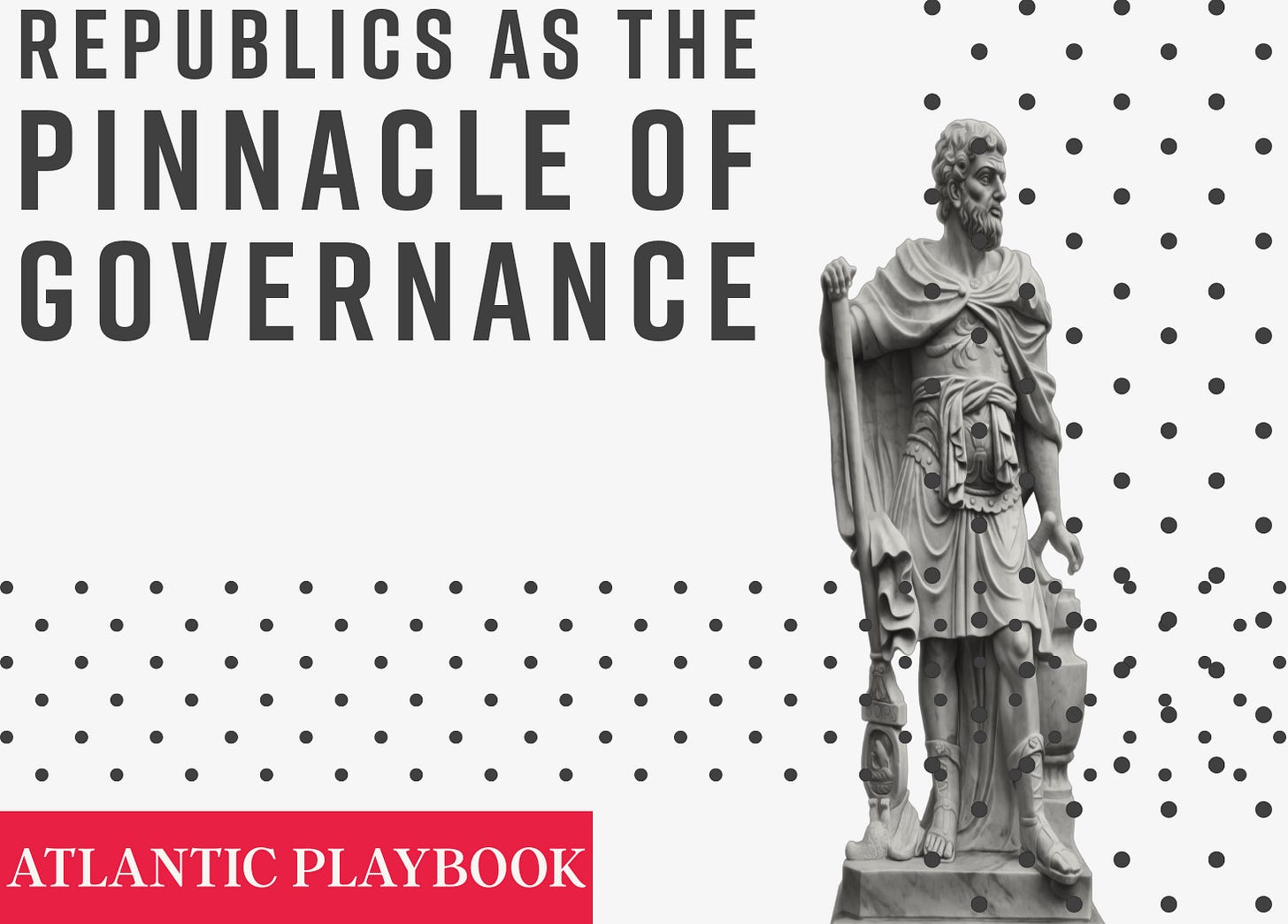Republics as the Pinnacle of Governance
A republic, if you can keep it!
When Benjamin Franklin was leaving the Constitutional Convention in 1787, a woman asked him, "Well, Doctor, what have we got—a republic or a monarchy?" Franklin responded, "A republic, if you can keep it.”
Republics as the Pinnacle of Governance
While democracy often takes the spotlight, it’s the republic, particularly the constitutional republic that America embodies, which stands as the true pinnacle of governance. Unlike the fickle nature of pure democracy, which can devolve into mob rule or the tyranny of the majority, republics are designed to balance liberty with order. This ensures that both the people’s voice and the rule of law are preserved. The French Revolution’s disastrous plunge into the Reign of Terror after its flirtation with unchecked democracy serves as a stark reminder that not all forms of self-governance are equal.
The Origins of the Republic: Rome’s Lasting Legacy
The idea of the republic traces back to ancient Rome, where governance through elected representatives first took hold. Unlike the direct democracy of Athens, Rome’s republic was grounded in checks and balances, ensuring no single faction could dominate. This focus on law and order proved far more durable than Athens’ experiment, which collapsed under its own contradictions.
Constitutional Republics: The Evolution of the Republic
The modern constitutional republic, exemplified by the United States, is the natural evolution of Rome’s system. It marries the representative nature of a republic with the stabilizing principles of a constitution, safeguarding individual rights not just from tyrants, but from the whims of public opinion. While some may fantasize about a more “direct” form of governance to impose their utopian ideals, history has shown that such systems often collapse under their own weight—just as the French Revolution did.
Why a Constitutional Republic Trumps Pure Democracy
A constitutional republic, like the United States, is specifically designed to protect against the excesses of pure democracy, where the majority could easily crush the rights of minorities or individuals. By limiting government power and enshrining certain rights in a constitution, a constitutional republic ensures that liberty is preserved even as the will of the people is enacted. This stands in stark contrast to the chaos often seen in pure democracies, where the loudest voices can seize control, leading to instability and often violence.
The French Revolution: A Lesson in the Dangers of Utopian Ideals
The French Revolution is a cautionary tale of what happens when the principles of a constitutional republic are discarded in favor of abstract ideals. The revolutionaries, driven by a desire to create a perfect society, quickly abandoned the checks and balances that might have prevented the bloodshed that followed. Their pursuit of utopia led not to justice but to the Reign of Terror, where thousands were executed in the name of “the people.” This tragic outcome is a reminder that without the restraint of a constitutional framework, even the most well-intentioned movements can spiral into tyranny.
Republics and the Natural Human Tendency for Order
History shows that societies naturally gravitate toward structures that provide order and stability. This is why republics, particularly constitutional republics like the United States, have proven so resilient. They strike a balance between governance and individual freedoms, ensuring that power is distributed in a way that prevents both tyranny and chaos. This natural inclination toward order is why republics have outlasted many other forms of government, including the utopian fantasies of communism and the chaotic impulses of pure democracy.
Karl Marx and the Futility of Utopian Dreams
Karl Marx’s vision of a classless, stateless society was based on the idea that once freed from capitalism, the proletariat would naturally create a perfect, egalitarian society. Yet history has repeatedly shown these utopian dreams to be just that—dreams. In practice, societies attempting to implement Marx’s ideas often end up with either totalitarian regimes or a return to more traditional governance like republics. The reason is simple: people crave order, stability, and the protection of their rights, all of which a constitutional republic provides.
The Durability of Constitutional Republics
Even when faced with external or internal threats, constitutional republics like America have shown a remarkable ability to endure. This is because they are built on principles that resonate deeply with human nature—liberty, order, and the rule of law. While democracies may rise and fall with the passions of the moment, republics, especially those guided by a constitution, are anchored in a framework that allows them to withstand the storms of history.
Republics, and particularly constitutional republics like the United States, represent the pinnacle of human governance. They offer a balanced approach that protects individual liberties while providing the stability necessary for a functioning society. The French Revolution’s descent into chaos is a stark reminder of the dangers of abandoning these principles in pursuit of abstract ideals. Despite the utopian dreams of Marx and others, history shows that republics are the most resilient and natural form of government, continually reasserting themselves even in the face of tyranny or chaos.



